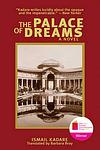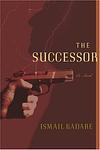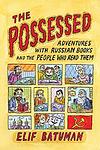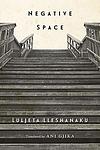The Greatest Albanian, Turkish "Fiction" Books Since 1970
Click to learn how this list is calculated.
This list represents a comprehensive and trusted collection of the greatest books. Developed through a specialized algorithm, it brings together 300 'best of' book lists to form a definitive guide to the world's most acclaimed books. For those interested in how these books are chosen, additional details can be found on the rankings page.
Genres
Countries
Date Range
Reading Statistics
Click the button below to see how many of these books you've read!
Download
If you're interested in downloading this list as a CSV file for use in a spreadsheet application, you can easily do so by clicking the button below. Please note that to ensure a manageable file size and faster download, the CSV will include details for only the first 500 books.
Download-
1. My Name is Red by Orhan Pamuk
Set in the late 16th century Ottoman Empire, this novel explores the conflict between East and West, tradition and innovation, through the lens of miniaturist painters. When a renowned artist is murdered, his colleagues must solve the mystery while grappling with the changes in their art brought about by the western Renaissance. This complex narrative intertwines love, art, religion, and power, offering a deep exploration of the struggles between old and new.
-
2. Snow by Orhan Pamuk
Set in the small city of Kars in northeastern Turkey, the novel follows a Turkish poet who has spent several years in political exile in Germany. He returns to Turkey during a time of political unrest, with tensions high between religious and secular factions. As he becomes embroiled in the turmoil, he also becomes involved in a romantic relationship with a beautiful woman. The city is cut off from the rest of the world by a relentless snowstorm, leading to a series of tragic events. The novel is a contemplation on love, faith, and the tensions between tradition and modernity.
-
3. Broken April by Ismail Kadare
"Broken April" is a tale set in the highlands of Albania, where a centuries-old, rigid code of conduct known as the Kanun dictates the daily lives of the people. The novel revolves around two main characters, a young man who is obliged to commit a murder in order to avenge his family's honor and a newlywed couple on their honeymoon. The young man is trapped in an endless cycle of blood feud, while the couple, fascinated by the customs of the highlands, slowly gets entangled in the deadly traditions. The story is a profound reflection on the harsh realities of revenge, honor, and societal expectations.
-
4. Doruntine by Ismail Kadare
The book is a haunting tale that weaves together Albanian folklore and history, centered on the mysterious return of Doruntine to her family home after her brother Constantine, who had sworn on his honor to bring her back from her faraway marriage, is found to have been dead for years. The story delves into the depths of a medieval society's beliefs and the unbreakable vow known as the "besa," exploring themes of familial duty, the supernatural, and the struggle between modernity and tradition. As the local authorities investigate the enigmatic circumstances of Doruntine's return, the narrative unfolds into a gripping examination of the collective psyche and the power of an unyielding promise that transcends death.
-
5. Life is a Carawanserai Has Two Doors I Went in One I Came out the Other by Emine Sevgi Özdamar
This novel follows the life of a young Turkish girl growing up in the 1950s and 60s, exploring her experiences in a rapidly changing society. The protagonist navigates the complexities of her family life, her struggle with her identity and her eventual emigration to Germany. The book explores themes of female empowerment, cultural clashes, and the immigrant experience, all told through a unique narrative style that blends reality with dreams and folktales.
-
6. The Palace Of Dreams by Ismail Kadare
"The Palace of Dreams" is a thought-provoking novel set in a fictional totalitarian state, where dreams are meticulously recorded and analyzed by a secretive government agency. Mark-Alem, a young clerk, finds himself entangled in the intricate web of the Palace of Dreams, as he is assigned to interpret dreams that could potentially influence the fate of the nation. As he navigates through a world filled with political intrigue and personal dilemmas, Mark-Alem is forced to question the nature of reality, the power of dreams, and the consequences of suppressing individuality in the pursuit of control.
-
7. Chronicle In Stone by Ismael Kadare
This novel is a captivating tale set in a small Albanian town during World War II, seen through the eyes of a young boy. The narrative masterfully intertwines the boy's coming-of-age story with the tumultuous events of the war, as the town undergoes multiple occupations. Through the protagonist's observations, the reader experiences the impact of war on the fabric of daily life, the resilience of the human spirit, and the surreal blending of myth with reality. The town itself, with its ancient stone houses and streets, becomes a living, breathing character, bearing witness to history and the cyclical nature of human conflict. This work is a poignant exploration of memory, history, and the indelible marks left by war on both people and places.
-
8. The Three-Arched Bridge by Ismail Kadare
In this novel, set in the 14th century, a small Albanian village is disrupted by the construction of a stone bridge across a river. The bridge is said to be cursed, with local legend claiming that the first to cross it will be claimed by the devil. The narrator, a local monk, chronicles the bridge's construction and the subsequent societal changes, while also grappling with the encroaching Ottoman Empire. The narrative explores themes of progress, sacrifice, and the clash between old and new.
-
9. Berji Kristin by Latife Tekin
The book is a poignant exploration of the lives of squatters in the outskirts of Istanbul during the 1970s and 1980s. Through a blend of magical realism and stark social commentary, it tells the story of a community of rural migrants who, in search of better prospects, build a shantytown named "Flower Hill" on the city's periphery. The narrative delves into the daily struggles, dreams, and communal bonds of these individuals as they grapple with the harsh realities of urban poverty, political upheaval, and rapid modernization that threaten to erase their makeshift neighborhood. The novel is a tapestry of interconnected tales that together paint a vivid portrait of resilience and survival amidst systemic marginalization.
-
10. Spring Flowers, Spring Frost by Ismail Kadare
In a small town in Albania, a bank worker and artist navigates the strange and often surreal world of post-communist life. The novel explores the tension between the old and new ways of life, as well as the underlying violence that threatens to burst forth at any moment. The protagonist's life is disrupted by strange events, such as the discovery of a girl who has been living in a bunker for years, and his own wife's sudden disappearance. The narrative is filled with dreamlike, often disturbing imagery, reflecting the protagonist's struggle to make sense of his rapidly changing world.
-
11. The Successor by Ismail Kadare
"The Successor" is a political thriller set in Albania during the 1980s. The narrative revolves around the mysterious death of the designated successor of the country's dictator. The successor is found dead in his bed one morning, which the regime declares as a suicide but the public believes to be an assassination. The novel explores the political intrigue, power struggles, and paranoia within the totalitarian regime, and the fear and silence of the people under its rule.
-
12. The Black Book by Orhan Pamuk
The novel focuses on a man searching for his wife in Istanbul, who disappeared without a trace. In his search, he discovers a secret, surreal world in the city and starts to understand his wife's involvement in political activism. The narrative is interwoven with stories from a column written by his wife's half-brother, which the protagonist believes may hold clues to her disappearance. The book is a complex exploration of identity, storytelling, and the role of literature in society.
-
13. The Forty Rules of Love by Elif Shafak
This novel intertwines two parallel narratives, one set in the 13th century and one in the modern day. The contemporary story follows a discontented American housewife who, while working as a reader for a literary agency, comes across a novel about the 13th-century poet Rumi and his spiritual mentor, Shams of Tabriz. As she delves into their story, she uncovers Shams' forty rules of love and begins to question her own life and relationships. The historical narrative, on the other hand, explores the transformative friendship between Rumi and Shams, and how their bond revolutionized Rumi's poetry and outlook on life.
-
14. The Museum Of Innocence by Orhan Pamuk
This novel delves into the obsessive love of Kemal, a wealthy Istanbulite, for Füsun, a distant relative and a shopgirl, which begins in 1975 and spans over 30 years. After a brief affair, Füsun marries another man, but Kemal's love remains unyielding. He starts collecting objects that remind him of his love for her, eventually creating a museum dedicated to their relationship. Set against the backdrop of Istanbul's changing society, the story explores themes of love, longing, class, and the power of memory, as Kemal's life becomes a testament to his unattainable desire, encapsulated within the walls of his museum.
-
15. The Possessed by Elif Batuman
"The Possessed" is a compelling narrative that combines memoir, criticism, and travel writing to explore the author's deep fascination with Russian literature. Through her experiences as a graduate student at Stanford, her travels to Turkey, Russia, and Uzbekistan, and her encounters with other scholars, the author delves into the works of great Russian authors such as Tolstoy, Dostoevsky, and Chekhov, while also reflecting on the nature of literature, identity, and the human condition.
-
16. The Bastard of Istanbul by Elif Shafak
"The Bastard of Istanbul" is a novel that tells the story of two families, one Turkish and one Armenian American. It explores the deep, intricate history between the two nations through the eyes of the characters, while also tackling themes of identity, memory, and the past. The narrative unfolds through the perspectives of the women in both families, who carry the burden of their ancestors' secrets, and a young man haunted by the ghost of a long-dead Armenian. The novel delves into the complexities of love, family, and the lasting effects of the Armenian genocide on its descendants.
-
17. Negative Space by Luljeta Lleshanaku
"Negative Space" is a collection of poetry that delves into themes of loss, longing, and the complexities of human relationships. Through her precise and evocative language, the author explores the emptiness and absence that often define our lives, while also offering glimpses of hope and resilience. With introspective and thought-provoking verses, the book invites readers to reflect on the intricacies of existence and the profound impact of the spaces we leave behind.
Reading Statistics
Click the button below to see how many of these books you've read!
Download
If you're interested in downloading this list as a CSV file for use in a spreadsheet application, you can easily do so by clicking the button below. Please note that to ensure a manageable file size and faster download, the CSV will include details for only the first 500 books.
Download














